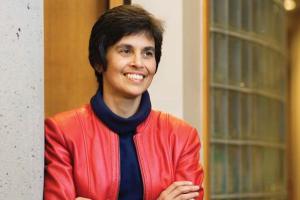
Cheryl Tobias is Senior General Counsel in the Vancouver Regional Office for the Department of Justice (DOJ). Her practice consists largely of appeals up to and including the Supreme Court of Canada (SCC) dealing with constitutional, criminal and Aboriginal rights issues. Working with the team of lawyers who handle extradition and mutual legal assistance matters, Tobias is also responsible for all other matters in the BC Region relating to the criminal law mandate of the Department, such as interventions on constitutional questions and liaison with the newly created Public Prosecution Service of Canada. Her portfolio “changes a lot from day to day,” she says, “so it’s a source of some amusement. But that’s one of the nicest things about it.”
Tobias first studied psychology before turning to law, taking her interests in people-oriented and analytical work in the direction of justice. Her decision to work with the DOJ was equally conscious: “I wasn’t very interested in law as a business,” she says. “I saw this as an opportunity to do a lot of litigation and to work on the cases as the case required and not necessarily as I would get paid to do it. And I don’t have to look for clients—there’s never any shortage of those!” Tobias continues to work with a number of her former UBC Law classmates at the DOJ, and her graduating class recently enjoyed its 25th reunion.
Tobias takes an active role in legal education, both formal and informal. On the formal side, she guest instructs UBC’s advanced legal research and writing course and works with CLE, PLTC and the UBC Trial Advocacy Program. “I've enjoyed the interaction with students and younger lawyers,” she says. “I offer the benefit of my experience and I benefit from being challenged by their ideas and their fresh approaches to the issues, and from being stimulated by their enthusiasm and energy. So it's a fair exchange. On the informal side, one of the great pleasures of my job has been the opportunity to work with and coach junior counsel on cases. I've worked with other counsel for periods ranging from days to years on particular files. Many of those are now among my friends.”
Involved in Aboriginal law work since 1992, when she litigated Jack, John & John, Sampson & Elliott and Little, Tobias cites the Van der Peet trilogy of commercial fishing cases as ones that stand out in her memory. She gives three reasons: “The most important was that it was a real [land]mark in terms of what Aboriginal rights were, what their characteristics were and what had to be proven,” she says. “The other reasons are somewhat personal. One is that it was my first speaking experience in the Supreme Court of Canada.” The second was spending an entire week in the highest court in the land. “I was junioring David Frankel,” she says, “and he told me at the time [it] was an experience that almost never comes around and would never be repeated in either one of our careers.”
Tobias handled the BC Supreme Court summary conviction appeal in R v Kapp, as well as the appeal before the Court of Appeal. The case is now before the SCC, and although she is no longer working on it, she’s following it with interest, as are many others:
You know, we hear a lot about the importance of consultation, accommodation and so forth. But Kapp is … the opposite side of the coin. [It’s] about non-Aboriginal people or primarily non- Aboriginal people who take issue with a program that is designed specifically for Aboriginal people, claiming Section 15, a breach of their rights to equality before the law. So we have an interesting question of how those rights are going to interact.
We were preoccupied for a long time—and we do continue to be—in determining what Section 35 means, what the Aboriginal rights and title are, what’s their scope, what is due to the people who hold those rights. But sooner or later you have to deal with the other side of the coin. If we’ve got a set of rights within Canadian society that [belong] to a particular group of people, then the question of how those rights interact with the people who don’t have them is going to come up.
Tobias believes that the order of the day now is to determine how Aboriginal rights and title can and should play out, keeping the interests of all stakeholders in mind: “There’s a question about what rights the Aboriginal communities have. But in a fundamental way, there’s no longer a question about whether they have rights. The enduring questions I see are, How do we all go about our business, and how do we make that work? What are the extent of the rights? What is the place of Aboriginal communities in the larger community? How do they take their place? What does that look like? What should that look like?”
Those are the questions for the next 25 years, and Tobias takes this opportunity to talk to the next generation of lawyers about working in Aboriginal law: “I have learned an enormous amount of the history of the country—and particularly this part of it—in a way that simply isn't possible by taking academic courses.
Aboriginal issues touch so many areas of practice now, especially government practice, that a broad academic background is important for this, as it is for so many other areas of practice. Another very important aspect, I think, is that practitioners acting for all parties should maintain a level of objectivity. This is an area in which opinions are sometimes polarized and passions run high, but it is necessary to maintain your professional objectivity.”
Written by Diane Haynes and originally published in the UBC Law Alumni Magazine, Winter 2008.